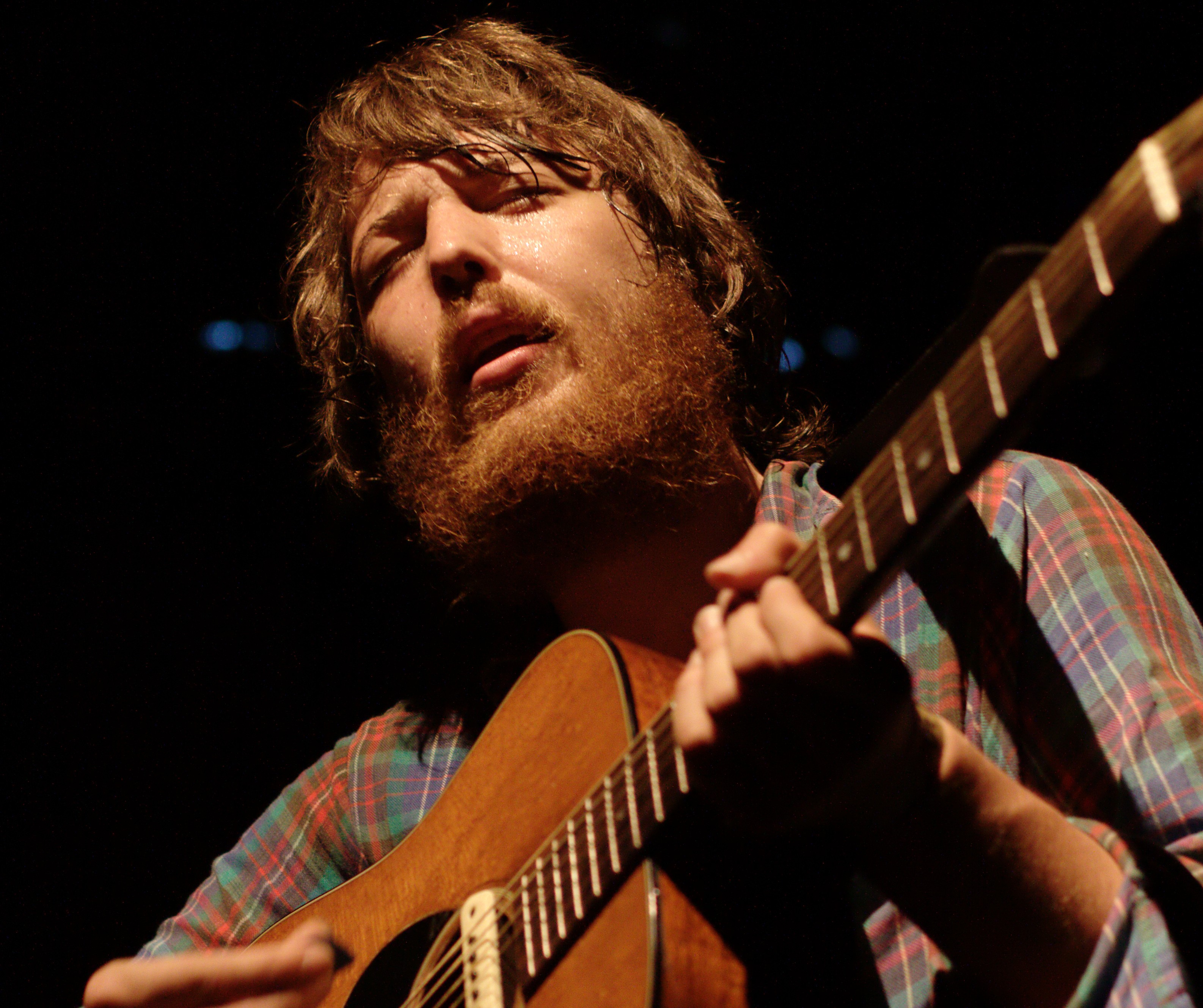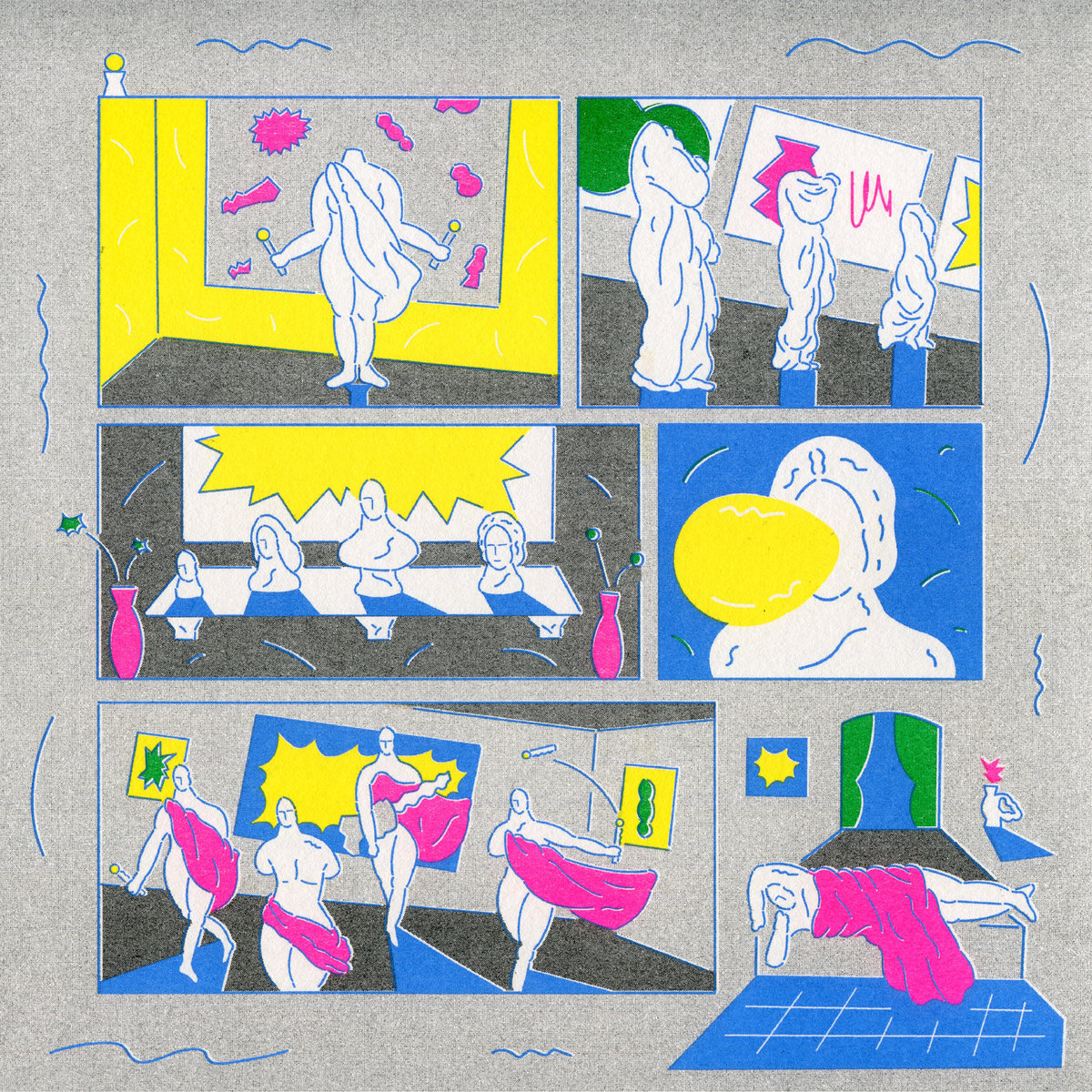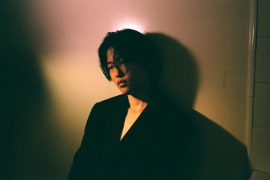Charmingly candid and tenderly honest contemporary folk artist Olive Klug reflects on the creation of their debut album ‘Don’t You Dare Make Me Jaded,’ the cycle of self discovery, and lyric-forward music.
‘Don’t You Dare Make Me Jaded’ – Olive Klug
I think that the thing that ties them all thematically and sonically together is this story of coming into myself. I call it a late in life coming of age.
Contemporary folk artist and “twenty-something teenager” Olive Klug is making waves with their whimsically nostalgic instrumentation and tender and poignant lyricism in their debut album, Don’t You Dare Make Me Jaded. Klug has been sharing their raw, story-driven music since 2019 becoming the voice for all the tender hearted and deeply reflective folk lovers.
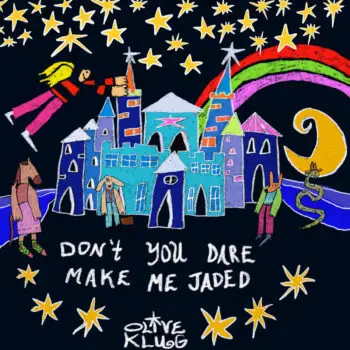
Amassing 8 million streams on tracks like “Raining In June” and 2.5M likes on their TikTok, Klug has found great success whilst exploring the depths of their mind, discussing everything from childhood nostalgia to self discovery, to grueling heartbreak in their music. Released on August 11th via Nettwerk Music Group, Klug’s debut album creates a rich and diverse soundscape taking listeners on a journey from Klug’s very own backyard in “Casting Spells” all the way to Catalina Island in “Ghosts of Avalon.”
Don’t You Dare Make Me Jaded depicts an arc of self discovery as the opening track of the album “Faking It” states:
No there’s not enough windows there’s not enough time
There’s a person who hates me inside of my mind
Who’s repeating the same tired line you don’t deserve the gold
And I need a clean slate so I set up a date and
I wait and I wait and I wait and
I wait and I wait till it’s far too late to get ready to go
If this is it
It don’t fit
But I’ll grow into it
If this is real why do I feel like I’m faking it
Whereas the closing track on the album “Taking Up Space” sings a different tune:
I hit rock bottom
Then something just clicked
And now I’m choking on the leftovers of the kid I used to be
And I feel sick
It is a practice
Taking up space
I’ll drive the car in the fast lane
At my own pace
I’ll cut the curtains
But you know I’ll leave the drapes
And I’ll start to like staring at the crooked smile on my own face
Whilst Klug recognizes “growth is totally not linear” they give listeners the opportunity to experience this growth from the beginning of the album to its close. The singer/songwriter sat down with Atwood Magazine to have a candid conversation about growing up, self discovery and taking up space.
— —
:: stream/purchase Don’t You Dare Make Me Jaded here ::
:: connect with Olive Klug here ::
A CONVERSATION WITH OLIVE KLUG
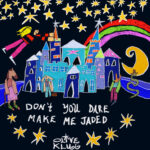
Atwood Magazine: For the uninitiated, who is Olive Klug? And what music do you make?
Olive Klug: Ooh, okay. Who am I? That’s the question I’ve been trying to answer, I guess. I feel like I have a lyric about that. Like, what is my lyric? Gimme a sec. I need to know what my lyrics are.
*laughs* Feel free to hunt, I promise I won't ask you to quote any more of your lyrics!
Klug: No, I think it’s funny. I like to quote my own lyrics. Here! “They say just be yourself/ But they forget that order’s tall/ I’m still trying to find it.” That’s my quote from “Self Help.” I don’t know who I am, I’m still trying to figure that out but I guess I can talk about my music. I make folk singer songwriter music. I make it pretty straightforward. I think that a lot of times there’s this pressure in music to do something really groundbreaking or different, or experimental and I’m like, I don’t make experimental music, I make folk singer songwriter music about my direct experience and I think that that is really cool.
I love that you embrace that directness! So much of your music centers around just your vocals and your guitar or piano. What about that, very stripped back, direct way of making music speaks to you?
Klug: It’s always been my favorite type of music. I’ve always listened to music, for the melody, but primarily for the lyrics. The lyrics paired with a really good melody, is what makes it so cathartic and is what allows people to really feel their feelings through music and process their feelings through music. So that’s really important to me, being able to hear and feel the singer and the writer’s experience and emotions through songs. So that’s what has always called to me and so many of my favorite artists have a similar style.
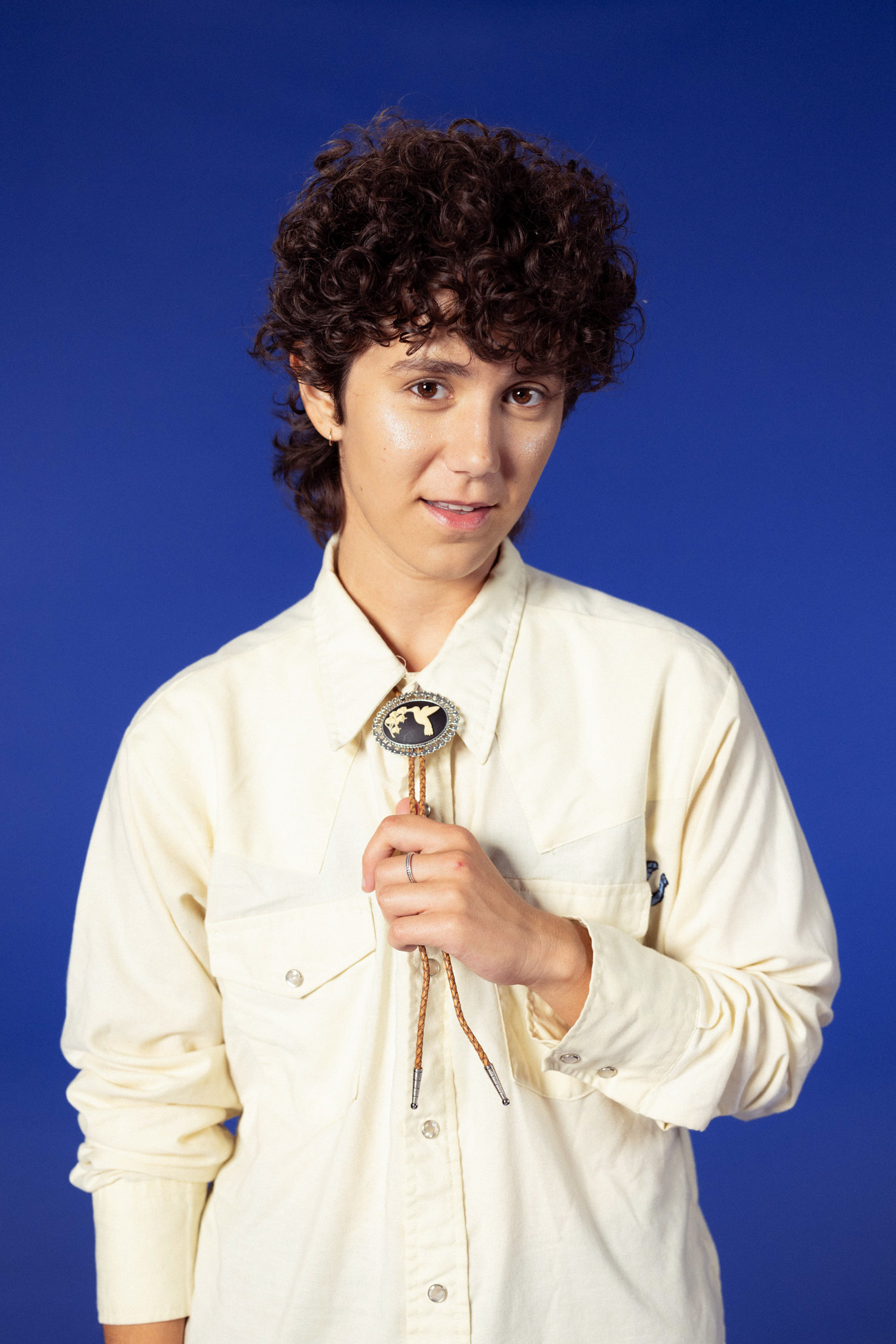
I think lyric forward artists are a world on their own. Who are some lyricists that inspire you?
Klug: My favorite lyricists are, definitely Adrianne Lenker! I think that she is an amazing lyricist. I’ve been listening to Vampire Empire for the past three days, on repeat. Like I have not listened to anything else.
Same here! I got a notification saying I listened to it twelve times in a row.
Klug: Amazing! I think people are giving them so much shit about it. And it’s really making me sad, because I really liked the version that they released. She’s just an amazing lyricist and I feel like she can do that really, really, intimate, stripped back type of song. And then she can also do a rock song really well and it’s so inspiring. She’s so cool. She’s actually one of my favorites right now. I also have been obsessed with Joni Mitchell since I was a baby. And so she’s another one that really inspires me.
Speaking of your own lyrics, you have so many memorable lyrics throughout the LP but what is it about “Don’t You Dare Make Me Jaded” that caused you to have it be the title of your debut album?
Klug: I knew I wanted to make my LP title a lyric from the album and not a song from the album. There are so many of my favorite albums that are just a song title. But I think that choosing one song can be like, “Oh, this is the big song of the album.” I just don’t think that that is true for any of the songs on this [album.] But I wanted to find a lyric that I felt summed up the time in my life that I wrote these songs. I’m 26 now but I wrote a lot of the songs in earlier adulthood from when I was like 23 and 24. And that was also during the later parts of the pandemic and I just felt like there was a lot of stuff going on in the world in my own life that had the ability to make me very jaded and make me very closed off and make me very pessimistic about the world. And I think that, who I am as a person, I tried to rise above that feeling and remain open and remain optimistic and maintain my childlike spirit, despite all of that stuff that was kind of coming my way and trying to make me jaded. And so that line, I chose that because I think that’s what a lot of these songs are about, the response to the world and not becoming jaded and closed off. But to be like, Don’t you dare make me jaded, I’m going to keep these spirits about me and remain optimistic.
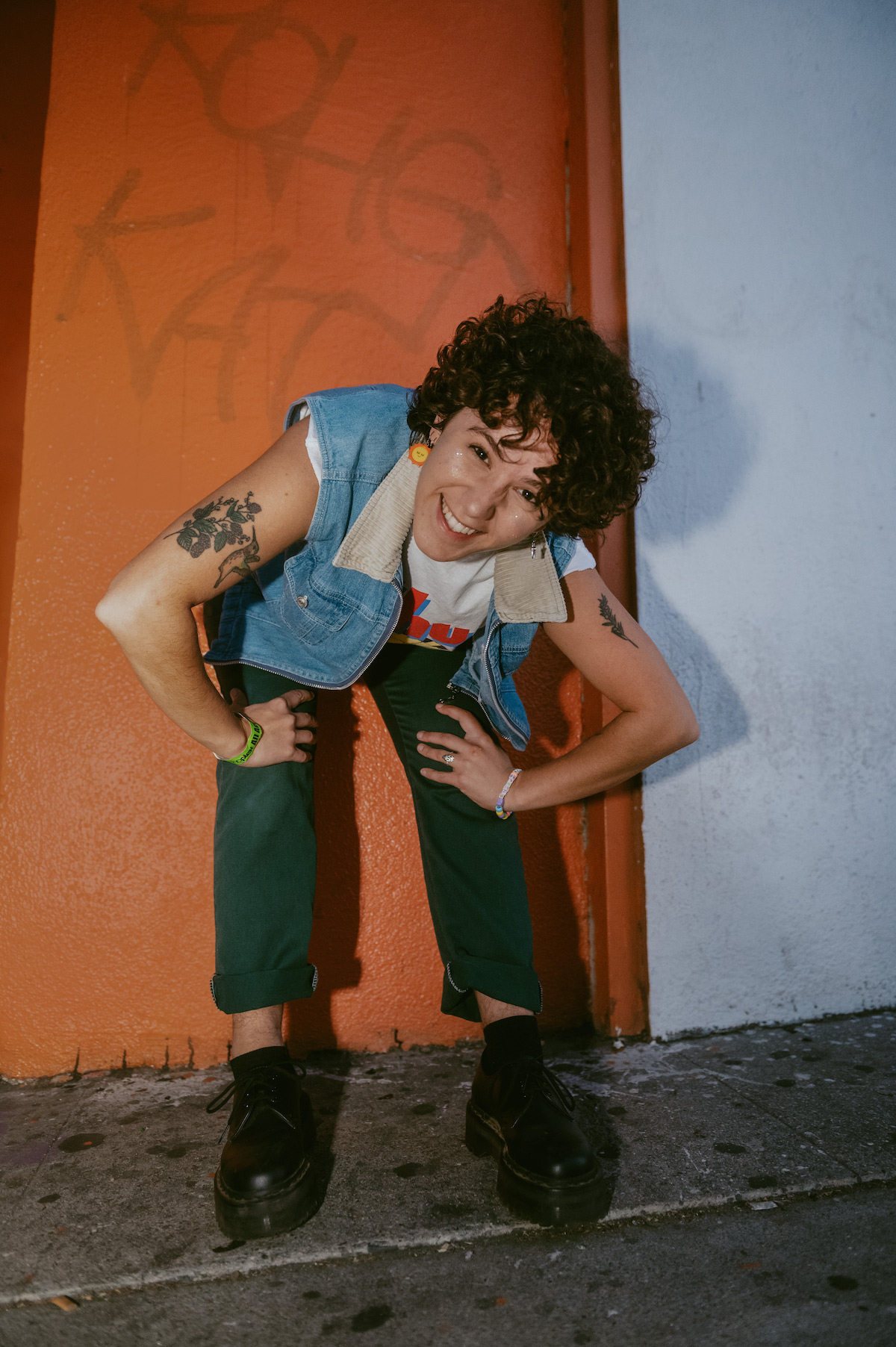
I think that's a really profound way of putting it. I think you do that really well throughout the LP and you explore that childhood innocence and joy. Do you feel as though that exploration of adolescents is what links the 11 tracks of the album? And did you find there was a difference between putting out singles and putting out one cohesive album?
Klug: I’ve never done this before. I’ve never put out an album before! I put out an EP when I was really young. But that had no intention whatsoever behind how the songs went together. It was just a combination of ‘these are my favorite songs I’ve written in the past couple of years.’ I think that the thing that ties them all thematically and sonically together is this story of coming into myself. I call it a late in life coming of age , because it’s not high school or college. And I think that’s usually what people think of when they think of coming of age. But I think there’s a very specific coming of age that happens when you’re in your early 20s. I say this a lot but when you arrive in the driver’s seat of your own life, and you get to make all your own decisions. It’s like, ‘Oh, my God, this is so scary. I have to make all my own decisions. I’m responsible for everything.’
I think a lot of the songs are about that. And even the songs that are about relationships, they are about the important relationships that shape us into the person that we are. And a lot of them are about the acceptance of how the relationships have evolved, instead of longing and trying to get them back or being angry at the person. I have one song, “Ghost of Avalon,” and [another] called “Do You Think of Us?” and they’re both about people that I used to love and accepting that these people aren’t necessarily in my life in the same capacity anymore but recognizing the importance that I still love them. Those songs are about relationships but also are related to this general theme of coming of age coming into your self acceptance. My final song on the album is called “Taking Up Space” and I really love that that’s the last message because I start out the album being really uncertain about myself and feeling impostor syndrome. And then I come to the end, and I’m like, “I’m going to claim who I am and I’m going to claim my space in the world.” I think that that is the journey of the album.
I love how you're redefining the coming of age to be that early 20s. I think there’s such a great evaluation of what growing into yourself means. “Out of Line” and “Coming of Age” are so fascinating to put back to back. I feel “Out of Line” embraces these more childish tendencies and looks for the childhood wonder and magic in life but coming of age discusses the frustration of feeling like a ‘20-something teenager.’ How do you feel about walking that line between the two?
Klug: I feel very lucky to do the job that I do, because it’s so different than what a lot of my friends are doing. I get to be a “26 year old teenager” in a way that a lot of my friends don’t get to be. Because capitalism wants most people to repress their feelings and not feel them and not think about them but in order to make money, I have to think about my feelings, I have to reflect and be nostalgic and be really indulgent in my feelings in a way that I don’t think I was able to when I was in high school in college. And so that’s really cool!
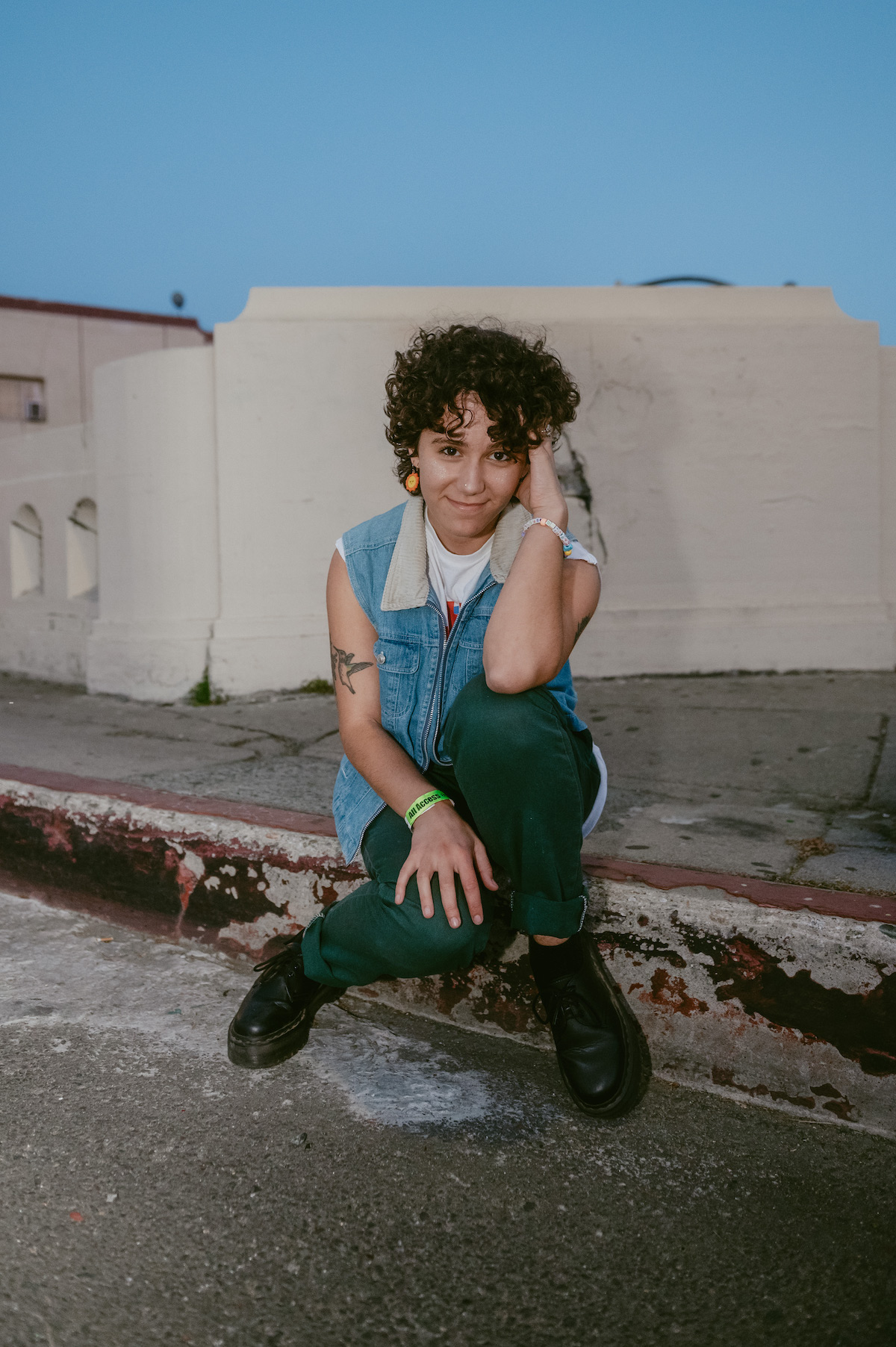
I love the way you explore emotions through these 11 tracks. But were there any songs that didn't make the cut for what you were trying to do thematically?
Klug: The album came together as I was recording it. So I didn’t decide ahead of time, which I feel like is what a lot of people do. But it all just kind of came together… I think one song that was interesting. I wrote “Song About America” pretty recently. And it’s very specific to a political time and a time in my life that wasn’t necessarily related to the time in my life that I wrote all these 11 songs on the album. I really wanted to release this song and I think it’s important that it gets out in the world, but I decided that I don’t want it to be on the album. And that was a more difficult last minute decision. That one’s just gonna be a standalone single and isn’t going to be on the album. But I think it’s just navigating the world of being on a label while being a person who makes last minute decisions. […] I added a song last minute, which I think was an interesting thing. There’s a song called “second opinion” that I wrote more recently. But I feel like it fits well with the part of the journey that is the beginning of the album. It was a time when I felt really disconnected from my sense of self. And I feel like we all get existential.
It was just that moment where you’re looking in the mirror and you’re looking around your apartment and you’re like, “Who is this person? Who am I? How did I make all these decisions that have led me to this place? I don’t feel like myself. And I just feel so disconnected from who I am.” I put that towards the beginning of the album because I think it’s like the other less silly side of “Faking It” where I’m like, “Oh, I don’t know what I’m doing, what’s going on?” And here I’m like, “No, seriously, I truly have no idea who I am.” I wrote it within the last year and added it at the last minute.
I think it's good to have both sides of this journey because the confidence in tracks like “Taking Up Space” compared to this can coexist and I think you depict that.
Klug: Definitely. Growth is totally not linear. I made it linear in this album but I wrote “Taking Up Space” before I wrote “Second Opinion.” So I wasn’t like, “Oh, I’ve arrived at this place. And this is how I feel all the time now.”
I think you could listen to this album on a loop and it restructures itself in a sense.
Klug: Yeah, definitely!
Throughout the LP I love the use of sound textures. You use grainy, muted tones with the opening track, and you have like a film whirring in “Parched” and birds chirping on “Casting Spells.” What was the inspiration behind building out those soundscapes for listeners to really feel like you're in the room with them?
Klug: That’s awesome! I really appreciate that compliment. That’s something pretty important to me in the recording process; allowing things to feel like you’re in the room with me, allowing things to not feel perfect or overly clean. I think that when production takes all the imperfections and all of the natural sounding elements out of a track, it also can take the emotion and the rawness of the track. So I really wanted to maintain that feeling and not just have clean guitar tracks and clean vocal tracks. I wanted to create soundscapes and wanted to create the feeling that we were outside, hanging out. A lot of what inspired me to do that was that I started on TikTok and some of the natural sounds that ended up making their way into my TikToks made that specific recording so special. So I wanted to incorporate that. I talked about this with my producer a little bit and he was like, “yeah, there’s a quality in iPhone recordings that I actually find really hard to capture with really fancy microphones.” and I totally agree. There’s something special about the imperfections of an iPhone mic, there’s on faking it. We actually layered a real mic with an iPhone mic to create a soundscape that felt real.
I love that you talk about how clinical recording can sound and it being something you're actively working against. I think sometimes singers can focus on a technically perfect vocal performance rather than a raw, emotion filled one. I'm just curious, if leaning into emotion over technical perfection is something you focus on?
Klug: I definitely want to lean into the raw emotion. I do think I’m kind of a perfectionist when it comes to vocals, though, so it’s hard to reconcile those two things. I know what my perfect vocal performance sounds like but I also want to have the emotions here. […] I used to do musical theater and people would always tell me like “Stop focusing on the vocal performance, focus on your emotions” And I was like, “I know, but I also want to sound pretty!” So balancing those two things can be really hard and I think I’m still working towards finding the right balance.
As someone who also did musical theater I think your vocal tone has a specific quality that prioritizes rawness rather than that technical perfection. At least from a listener’s ear.
Klug: I think musical theater influences my writing and my music so much. So there’s no way to really separate that from the way that I write and perform. And there was a while where I was kind of embarrassed about it but now I know that’s totally who I am. And I think that’s totally why a lot of the people who listen to my music enjoy my music, because it has those elements of theater honestly.
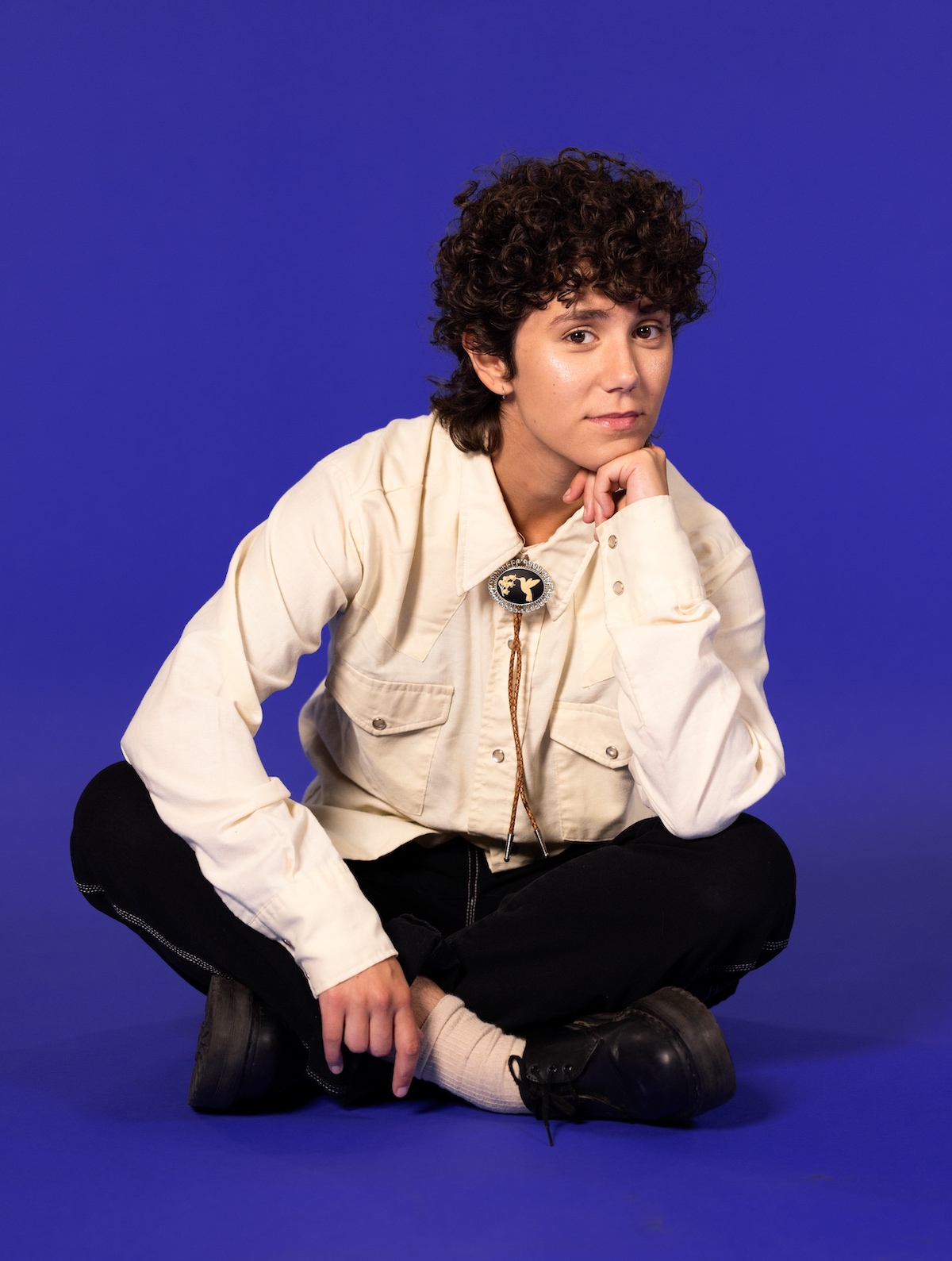
I wanted to ask you about the little campfire chant towards the end of “Out Of Line.” What was the story behind that?
Klug: I was on tour with Odie Leigh and Kevin Atwater last June. I hadn’t recorded the song yet and Odie was doing all these sing-alongs with [their songs] I was like “That’s so fun!I want to sing along!” But I didn’t know what song to do a sing along with because I don’t do a lot of repeating lines.I feel like I just have so many lyrics in my songs. But the last part of “Out of Line” is fun and people can really sing along and it’s silly! I did it once at the show in DC and it was so fun! And it made the entire experience different. It reminded me of when I was a camp counselor, and we’d teach songs to kids, it was just so much fun to hear everybody singing it back. A couple months later, I went into the studio to record it and I was like “We have to have the big gang vocal for that part.”
It’s not really a song about me necessarily, it’s more of a community song. I’m inviting everybody to be this way and to ignore the rules. So I think it was only fitting that I had a group singing with me. So that group is my producer, Ehren Ebbage and a few friends who just happen to be in Eugene, Oregon. So Philip Farrington and Georgia Parker, who are also musicians, came into the studio. […] But it was all musicians who were doing it and at first, I was like, “They sound too good. They sound too perfect.” And I was like, “You have to do this like you’re drunk, pretend you’re four, five drinks in and you’re at like a bar. And you’re really excited to be singing along to the song.” And that changed everything! I was like “sound worse, sound intentionally bad.” And it made it so much better. And if you listen really closely, you can hear that Philip does, some little screams and laughs and stuff… You just have to be as silly as you can with it. Because that’s what creates a special feeling when I perform it live.
That’s so lovely! Speaking of those ‘lightning in a bottle’ moments on the album, are there any other moments that really stood out to you while creating this LP?
Klug: I wrote “Coming of Age,” and it was another one of those viral internet songs that I was like, “Oh I have to record this.” I mean, as a small artist, if something goes viral, you have to just capitalize on that moment, unless you really hate the song. I think there are people who are really against that, I know Lizzie McAlpine is like “I’m never going to record “You Ruined The 1975.” And I’m like “Listen, that’s great for you, but you’re famous.” I need to look at this as a business and I’m just responding to what people are requesting of me because I need to do my thing. Unless I really hate the song, which there’s a couple of songs that I haven’t recorded just because they’re not me.
But the response to “Coming of Age,” was so huge and it fit the theme of my album. But at first I didn’t like it. It was so cheesy and I was embarrassed by some of the lyrics and I felt like it was too pop-y. So I went into the studio, and I was like, “I want to record this song, […] And I had an idea that I wanted a kind of pop production. I liked the concept but it just wasn’t working. […] I went home and the first thing that came on when I got into the car was folk punk. I’m a huge folk punk fan! The Mountain Goats, Apes of the State, Kimya Dawson, Pigeon Pit. The song that came on was an Apes of the States song called “Bill Collectors theme Song” and it was all about being an angry twenty-something who doesn’t know what to do. And I was like, “Oh, shit. This is the vibe of this song” and I had that lightbulb moment in the car. I was like, “It’s not a pop song, it’s a self ironic folk punk song, that’s what it is!” I went home, wrote a second verse that I loved, wrote this bridge that was really angry and I came into the studio the next day with a completely new perspective. Having that moment of transforming this song I felt was kind of cheesy and discovering what it was supposed to be was such a fun moment. And when we recorded it, it just came out so seamlessly.
That’s such an awesome journey! I wanted to talk about the track “Ghost of Avalon” next, it was one of my favorite tracks. But it starts off with this old school recording: what is the story behind it?
Klug: Oh my God, okay, yes! Catalina Island’s main town is called Avalon. And the person that I wrote this about has all these pictures of them in Avalon posing next to these signs. […] So I looked up all of these tourism videos from the town and I found one from the 40s. And I had all these crazy moments where I was like we should incorporate that clip in the beginning and we should film a music video on Catalina Island and make it look all old timey! I was just super excited about that idea. […] All of my inspirations for the production on [Ghost of Avalon] were Simon and Garfunkel and Judee Sill, older singer-songwriter stuff and this old old timey found sound. I just wanted to make it sound like a 70s folk song. And so I was like, “If we’re doing a lot of vintage inspiration, it would be cool to have this other vintage soundscape in there.”
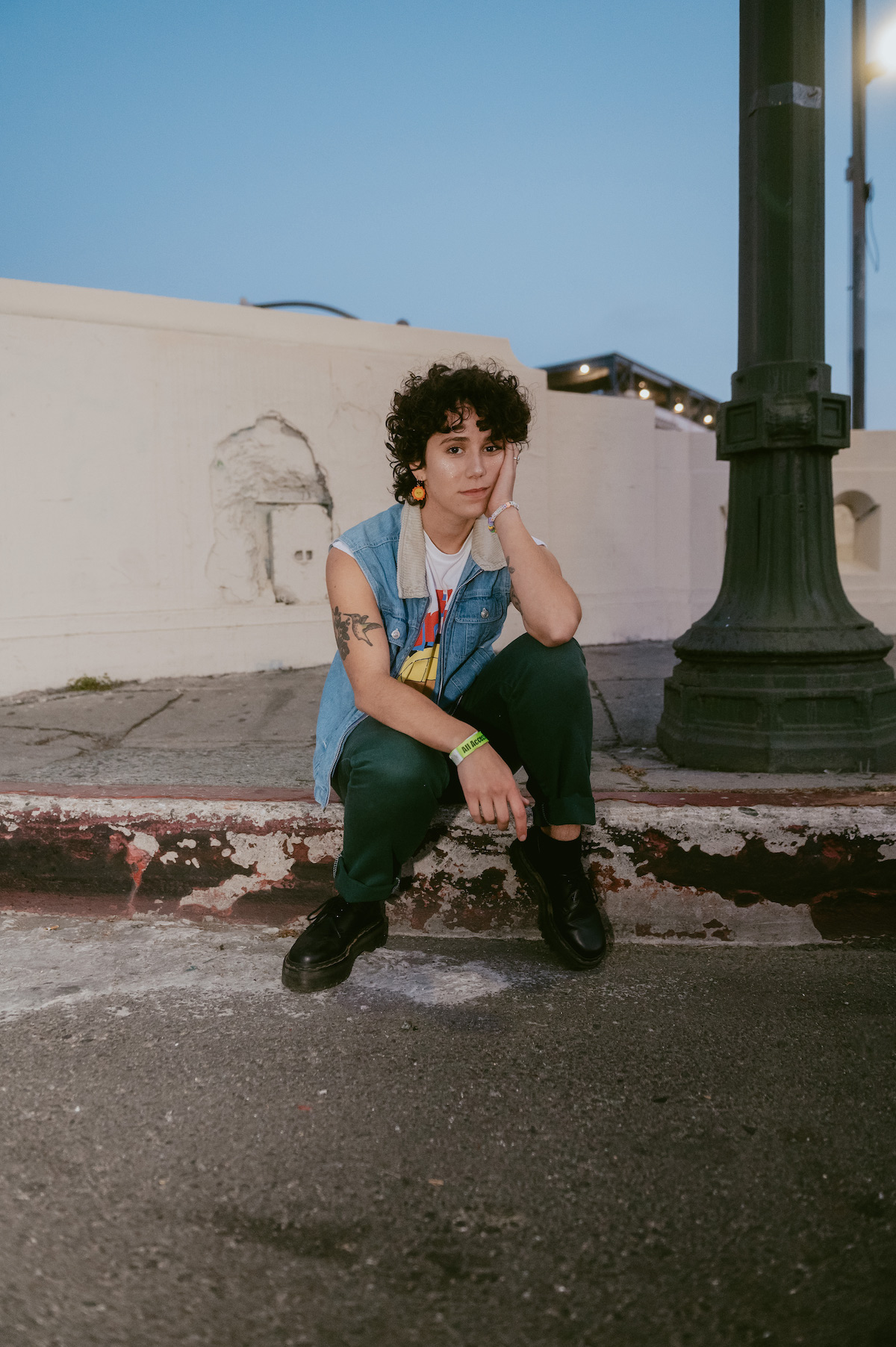
I think it was so awesome. And I think that it aligns with the message of the song, the relationship is vintage and nostalgic in some senses. You had a similar message with “Do You Think of Us?” as well. You take such a tender outlook on how those relationships impacted you as a person. What was the process of reckoning with those relationships and making it into a track others are hearing and relating?
Klug: It’s still really weird to write songs about people and it’s really difficult sometimes. The way that I look at things as an artist is so different than how I look at things as an emotional person who has relationships. […] I look at the songs from the perspective of an artist and a business person and I’m like “These are good songs, I did a good job writing these songs, people will like the songs, this fits on the album this way.” And then have a completely different [reaction] as an emotional being who has relationships.
I want to talk about the closing track, “Taking Up Space.” I think it's such a powerful track to end the album on and it's by far one of my favorites. I think so often, as queer people, we are told to choke down comments and minimize ourselves. I love your response to that treatment being “I’m gonna plant both feet on the ground/ I’m taking it in, I’m letting it go/ I’m taking up space” How is it getting to that healing mindset and then conveying it to other people?
Klug: Yeah, I think that getting to that place was really hard. And I don’t always feel like I’m at that place. One of my favorite lyrics in that song is “I’m choking on the leftovers of the kid I used to be” that was one of the first lyrics [I wrote]. I was a really shy, awkward kid and I wasn’t very confident. I was always the kid that got bullied because I’m a very soft person. Then when I got to middle school and high school I tried to conform and play that game because I was terrified of being bullied. So I didn’t really come into myself until I got to college. But still I struggled to feel like I deserved to take up space and deserve to be where I was and I have imposter’s syndrome, especially with music. Because I don’t really know music theory. And I didn’t go to Berklee College of Music. So I don’t know a lot of that stuff that a lot of people who don’t even have as much success as me do…
I feel like I grew up believing all these things about myself and trying to make myself small for other people. And now that I am in this position, where it’s really required of me to take up space, make decisions for my art, take videos of my face and say, “Look at my face, listen to my song.” It’s really hard and really vulnerable. And it’s been so difficult for me to be like, “I deserve this. I deserve to be here. I deserve to take up space in this world.”
The past year learning the music industry has been really hard and interacting with all these random 40-year-old men who run the industry has been really hard because I have to claim myself and my opinions and my music as worthy. It’s so fucking hard and it’s really different than anything I’ve ever done… I feel like a different person came into my body and wrote the chorus being like, “I’m taking up space, I can do this, eff off I’m believing in myself and I deserve this.” Because I think I’m still really working towards that. It’s almost an aspirational song… it’s still a process for sure.
Following the release of your album on August 11th, what else have you got going on?
Klug: I’m going on a headline tour, which I’m really excited about. I’m doing a show in London and Dublin. And I’m doing a show in Cork, Ireland, which is a very random town. And then I’m doing a West Coast tour as well. San Diego, Los Angeles, San Francisco, Portland, Seattle, and Vancouver, coming up in September. So I would really love to see people there. And I’m bringing a band, which is really exciting. I’m just so excited to travel with my friends. And yeah, y’all should come to my shows because they’re gonna be really fun!
— —
:: stream/purchase Don’t You Dare Make Me Jaded here ::
:: connect with Olive Klug here ::
Stream: “Parched” – Olive Klug
— — — —

Connect to Olive Klug on
Facebook, Twitter, TikTok, Instagram
Discover new music on Atwood Magazine
© Erik Bergamini
:: Stream Olive Klug ::

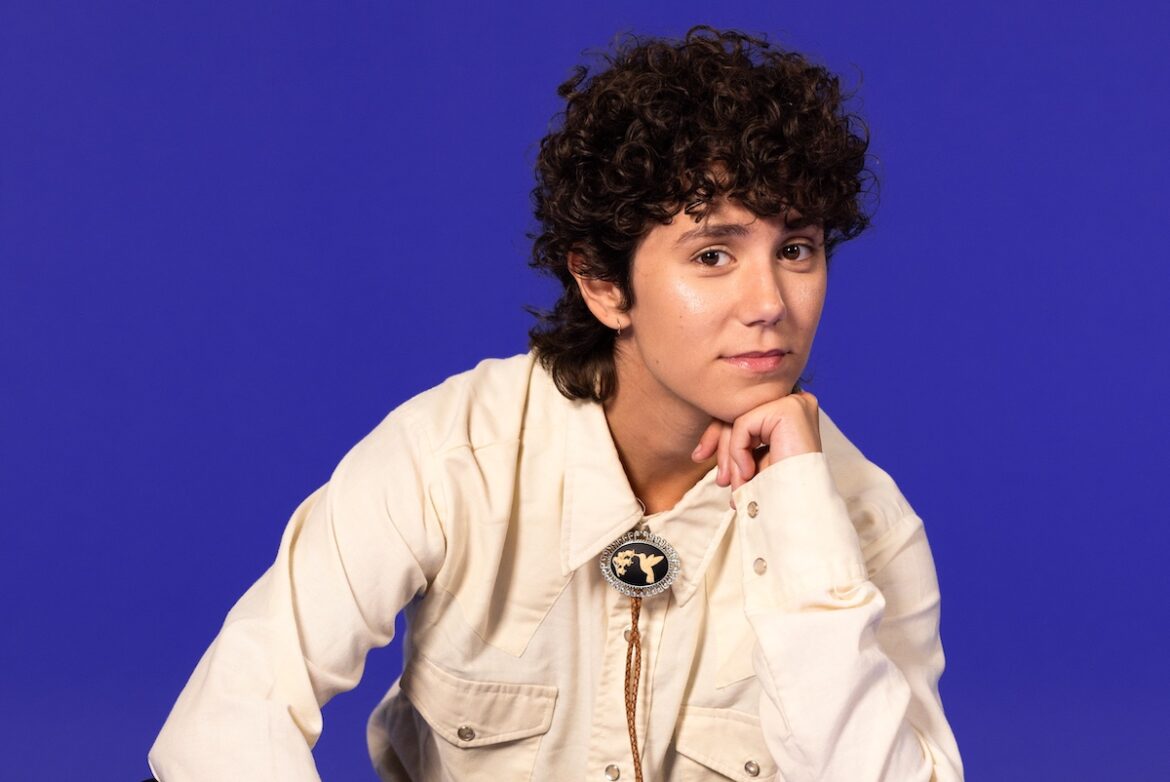
 © Erik Bergamini
© Erik Bergamini